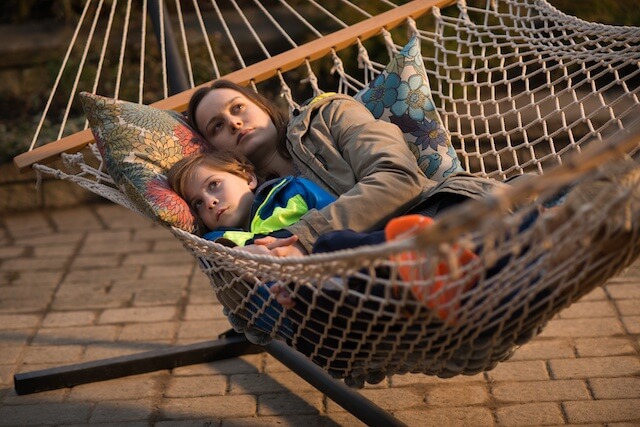‘Room’ The indie “Room” opens with disassociated shots of random objects. But the confusion hardly ends there. The shots are all tight close-ups, so it takes awhile to realize we’re not in just any living space — or, specifically, we’re not in just any cramped studio apartment, where the bed lies near to the kitchen. Some time passes before we realize the long-haired child is not a she but a he named Jack (Jacob Tremblay) and the sometimes doting, sometimes irritable young women he lives with, Joy (Brie Larson), is his mom. Indeed, it’s probably 15 minutes before we realize they never leave because they can’t, and the grouchy man who visits Joy at night, while Jack sleeps inside a wardrobe, is not only their captor, but Jack’s biological father. One could probably make a visually gimmicky film out of this tale, or one that rubs our noses in horror and depravity. But “Room,” by Irish filmmaker Lenny Abrahamson (of “Frank,” the movie where Michael Fassbender sings art-rock with a papier-mache head), is a freewheeling, even periodically upbeat portrait of childhood. It’s told from Jack’s perspective, and Joy has made sure he’s blinkered. He doesn’t know that she was kidnapped seven years ago, that he was the result of rape, that Joy continues to be abused every couple nights, that there’s an outside world, that the images on their flickering TV come from a real place, etc., etc. Joy isn’t some lying dictator, like the parents in “Dogtooth,” but trying her best to give Jack the illusion of a happy childhood. And it’s worked: He’s a flurry of energy, prone to the usual kiddy temper-tantrums. Abrahamson follows suit. He doesn’t rub our noses in Joy’s abuse, and he keeps the filmmaking lively. It’s all blink-and-miss close-ups of their cluttered, cramped space, mimicking how Jacob has never tired of seeing the same-old for the five years he’s been alive. RELATED: Lenny Abrahamson says the grim “Room” is actually about a “happy childhood” It’s a relief at the halfway mark when a hare-brained escape plan actually (perhaps semi-illogically) works, shuffling Joy and Jack into the real world and their captor off to jail. (Though we wisely and tellingly never get the satisfaction of learning his exact fate.) The second half, though, is more like a necessary evil. Our heroes wind up installed in a roomier form of prison: the suburban castle belonging to Joy’s mom (Joan Allen) and her sad-eyed but huggable second husband (Tom McCamus). Jack is predictably withdrawn; Joy is predictably on edge, snapping at her overly worried mother, anxious about an unsure future. Their lives post-imprisonment are shambling and meandering, and so is the film, as it lurches towards a shrug of a conclusion. It’s a dynamic and harrowing film that morphs into an earnest indie about family strife. That, of course, is how it should be. It’s an honest depiction of struggling to overcome un-overcome-able trauma that can’t help but feel like a drag. A drag, after all, is what it would be. One can even excuse the way Abrahamson shoots the second half, which is plainly. He’ll do some low-angle shots to stay with Jack’s perspective, but it more often looks like any other drama set in a tasteful, white-walled suburban manse. He doesn’t need to go Terrence Malick on the back half, but he should have a little, at least at first. Abrahamson blows the big reveal, when Jack first views the outside world. It should be an avalanche of new sensations. Instead we get an establishing shot of the outdoors before Jack himself has seen it, missing the big moment when Jack’s entire perspective goes into overdrive, trying to take in these sights that are, for a five year old, genuinely alien. It’s a big carp in a film that otherwise gets things right, even in the second half, which avoids a lot of cliches and is free to let some wounds stay open. It may even make us long for the unpleasant but razor-sharp first half, when matters were worse but you felt a filmmaker seizing the chance to be fully alive.
Director: Lenny Abrahamson
Stars: Brie Larson, Jacob Tremblay
Rating: R
3 (out of 5) Globes
‘Room’ finds a striking way to show trauma from a child’s view

A24
Follow Matt Prigge on Twitter @mattprigge
















